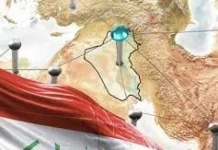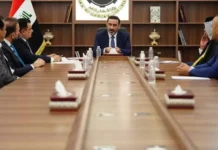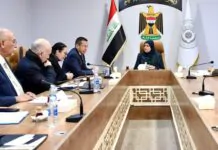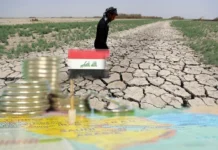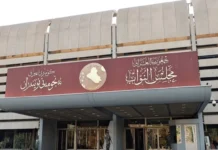Tishwash: The Minister of Finance reveals the reason for the delay in approving the budget.
Finance Minister Taif Sami revealed the reason for the federal government’s failure to approve the budget and the delay in submitting it to parliament, according to a statement by MP Rashid Al-Maliki on Wednesday.
Al-Maliki said in a statement today, “Finance Minister Taif Sami informed us today during her meeting at the ministry’s headquarters that a committee in the Council of Ministers is working to complete the budget schedules.”
Sami was also quoted as saying: “The reason for the delay is due to efforts to maximize non-oil revenues and find financial sources to cover the budget deficit from fees, taxes, service charges, etc., and that the government is committed to submitting the budget schedules.” link
Tishwash: News reveals details of the new agreement between Baghdad and Kurdistan.
An informed source revealed details on Wednesday of a new financial agreement concluded between the federal government in Baghdad and the Kurdistan Regional Government (KRG), aimed at settling salaries, oil exports, and unifying revenues.
The source told Shafaq News Agency that the agreement stipulates that the Kurdistan Regional Government will receive 240 billion dinars in revenues for May and June, at a rate of 120 billion dinars per month, in addition to delivering 230,000 barrels of oil per day to Baghdad, in exchange for the latter sending the salaries of the region’s employees for those two months.
He indicated that the regional government will begin the process of disbursing local revenues from border crossings, along with the agreed-upon amount of crude oil, as part of the implementation of the terms of the new agreement.
The source added that the next phase will witness meetings between joint technical committees to review and audit figures and statistics related to oil exports and imports, as well as to discuss the region’s share of the federal budget.
For his part, an Iraqi government source said that the federal cabinet is awaiting the implementation of the Kurdistan Regional Government’s pledges to resolve the current crisis.
He explained that the federal government is awaiting an official letter from the Kurdistan Regional Government to begin implementing the agreement by the relevant committees.
The Kurdistan Regional Government’s Council of Ministers approved the new understandings with Baghdad during its session held this morning.
The roots of the recent salary crisis between the federal government in Baghdad and the Kurdistan Regional Government (KRG) lie in ongoing disagreements over oil export mechanisms and the unification of public revenues. This is a long-standing crisis that resurfaces from time to time, but it has significantly worsened since May 2025, when the federal government refused to send salaries to KRG employees.
Baghdad justified the delay in disbursement by Erbil’s failure to deliver the agreed-upon quantities of crude oil (230,000 barrels per day) and its failure to transfer non-oil revenues from internal ports to the state treasury, which the federal government considered a violation of previous agreements included in the three-year federal budget law (2023-2025).
For its part, the regional government confirmed that it is facing technical and political difficulties in delivering the full amount of oil, especially given the ongoing suspension of oil exports via the Turkish Ceyhan pipeline since March 2023. This suspension stems from an international arbitration ruling against Turkey in the oil export dispute with Iraq. This has forced Erbil to rely on domestic exports to meet its financial needs. link
***********
Tishwash: Financial Sovereignty”: Why Has Iraq Not Emancipated Financially from the Grip of the US Federal Reserve?
that is witnessing Iraq Increasing American pressure regarding a set of demands that it considers Washington Essential, foremost among them the issue of armed factions.
These pressures have become more prominent recently when salaries were paid to members of the Popular Mobilization Forces, with Iraqi MPs asserting that the reason is due to American pressure exerted on Iraqi government There are also reports that Washington intends to restrict the flow of dollars into Iraq to limit their smuggling.
While negotiations are taking place betweenBaghdadAnd Washington, regarding these files, observers believe thatUSStill holding one of the strongest cards on the table.IraqControlling its financial revenues from oil exports by keeping them in US Federal Reserve accounts since 2003.
So why is Baghdad still subject to this financial arrangement two decades after the invasion? Why can’t it receive its oil revenues directly, as other oil-producing countries do? And why have successive governments failed to free themselves from American financial hegemony?
Historical Background to Financial Hegemony
In May 2003,Security CouncilResolution No. 1483, which stipulated that revenues from Iraq’s oil and gas exports be deposited in a special account at the US Federal Reserve under the name “fundIraq’s development.
A portion of these revenues – 5% of total oil and gas exports – was allocated to compensateKuwaitRegarding the damages resulting from the 1990 invasion, which continued until 2022 when Iraq completed paying its compensation, which amounted to approximately $52.4 billion.
According to MazharMohammed Saleh, the economic advisor to the Iraqi Prime Minister, the rest of the money was transferred to the accountCentral Bank of Iraq, which is responsible for financing the government and the Ministry of Finance with liquidity, given that the Iraqi dinar is priced in dollars.
Saleh adds thatUnited NationsLegal protection for these assets was provided under Resolution 1483, until it expired in 2011, following the implementation of Security Council Resolution 1956. In parallel, the US president issued Executive Order 13303 to protect Iraqi assets, a decision that remains in effect today despite some amendments.
According to Saleh, the goals of US protection of Iraqi assets are to ensure Iraq’s reconstruction, protect its assets from compensation claims from companies and individuals, and avoid judicial seizure of Iraqi assets in cases filed since the 1990s.
Current US pressure
: Experts believe that Iraq, despite the expiration of many of the legal reasons that imposed this financial arrangement, remains subject to strict financial oversight by theWashington, differs from the usual procedures in the international banking system.
Dr.Abdulrahman Al-MashhadaniA professor of economics at the University of Iraq in Baghdad, Al-Mashhadani said that Iraq is facing unprecedented tightening of financial audits due to US concerns about money laundering, terrorist financing, and dollar smuggling, especially since Baghdad has not adhered to financial oversight controls in recent years.
Al-Mashhadani asserts that this audit has led to a significant decline in money laundering operations in recent months, citing the incident of “theftcentury“In 2022, more than $2.5 billion was smuggled, 70% of which was through Iraqi banks.
For his part, a member of theFinance CommitteeMP Jamal Kocher points out that most oil-producing countries deposit their money in the US Federal Reserve because oil is sold in dollars, but Iraq suffers from complete dependence on oil revenues without any significant alternative resources.
Kocher stresses that US pressure is not always exerted directly, but rather focuses on two issues:
– The use of US weapons outside the authority of the state.
– The smuggling of dollars to parties hostile to the United States.
In the same context, Al-Mashhadani explains that Iraq does not enjoy the same ease as other countries in disposing of its revenues, and suffers from a deficit inLibraCommercial interests, in addition to restrictions on the use of other currencies or an equal exchange system with other countries, weaken its ability to be financially independent.
Al-Mashhadani warns that the imposition of US economic sanctions on Iraq is not unlikely, noting that 32 Iraqi banks are currently subject to US sanctions, and Baghdad has not been able to lift any of them despite the passage of years.
Iraqi Voices
Economic researcher AnmarAl-ObaidiThe problem is not with depositing funds at the US Federal Reserve, but rather with the restrictions imposed on their free use, unlike other countries.
Al-Obaidi says that Iraq’s political fragility and continued instability have prevented successive governments from settling the outstanding compensation issue, emphasizing that addressing this issue will enable Iraq to gradually achieve financial liberalization.
Al-Obaidi notes that the government’s measures to combat money laundering and currency smuggling have achieved significant improvement over the past two years, but the country still needs banking reforms and comprehensive automation of its systems to bolster international confidence.
For his part, economic advisor Mazhar Muhammad Salih believes that getting rid of US oversight is possible in the future, but it requires gradual political and economic measures, beginning with restoring international confidence.
Economic analyst Saman Shali agrees, believing that ending US tutelage requires a courageous political decision from various blocs, in addition to working to rationalize spending and settle debts related to compensation from international companies.
Shali suggests using international law firms to negotiate with these companies, similar to what happened in the Kuwait compensation case, stressing that the process, despite its difficulty, will pave the way for Iraq to regain its financial sovereignty.
Options for Liberation and Financial Independence
Economists believe that liberating Iraq from the grip of the US Federal Reserve requires a comprehensive plan that includes:
– Completely reforming the Iraqi banking system
– Automating financial and accounting procedures
– Reducing corruption in financial institutions
– Settling compensation claims through international legal tools
– Diversifying sources of income away from oil.
Analysts believe that continued reliance on the US financial system without radical reforms will keep Iraq hostage to external agendas that restrict its ability to move.
Towards financial independence is conditional on political will,
despite the end of most of the legal restrictions imposed byinternational communityDespite Iraq’s post-2003 financial situation, the country remains under tight financial control by the United States, reflecting the fragility of Iraq’s economic and political structure.
Experts believe that the opportunity to liberate itself from this hegemony remains, but the matter depends on a unified political will and a strict economic vision that rebuilds international confidence in the Iraqi financial system.
The question remains: Does it have the capacity?Iraqi governmentWill the country have the will and ability to wrest its financial sovereignty, or will American influence continue to control the country’s economic lifeline for decades to come? link

